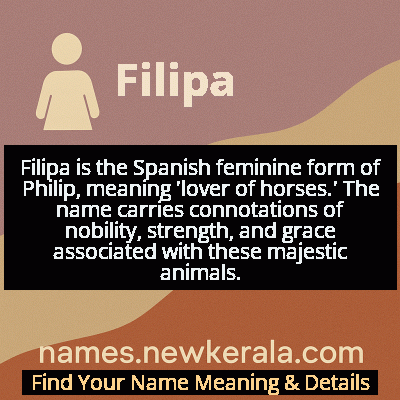Filipa Name Meaning & Details
Origin, Popularity, Numerology Analysis & Name Meaning of Filipa
Discover the origin, meaning, and cultural significance of the name FILIPA. Delve into its historical roots and explore the lasting impact it has had on communities and traditions.
Name
Filipa
Gender
Female
Origin
Spanish
Lucky Number
8
Meaning of the Name - Filipa
Filipa is the Spanish feminine form of Philip, meaning 'lover of horses.' The name carries connotations of nobility, strength, and grace associated with these majestic animals.
Filipa - Complete Numerology Analysis
Your Numerology Number
Based on Pythagorean Numerology System
Ruling Planet
Saturn
Positive Nature
Ambitious, efficient, realistic, and authoritative.
Negative Traits
Materialistic, stressed, confrontational, and can be overly ambitious.
Lucky Colours
Dark blue, black.
Lucky Days
Saturday.
Lucky Stones
Blue sapphire, amethyst.
Harmony Numbers
2, 4, 6.
Best Suited Professions
Business leaders, managers, financial services, law enforcement.
What People Like About You
Leadership, determination, organizational skills.
Famous People Named Filipa
Filipa de Lencastre
Queen Consort
Founded the Aviz dynasty and significantly influenced Portuguese politics and culture
Filipa Sousa
Singer
Represented Portugal in Eurovision Song Contest 2014 with song 'Life'
Filipa Areosa
Actress
Prominent Portuguese actress known for roles in television and film across Iberian media
Filipa César
Artist
Internationally recognized visual artist exploring colonial history through experimental film
Name Variations & International Equivalents
Click on blue names to explore their detailed meanings. Gray names with will be available soon.
Cultural & Historical Significance
In Spanish culture, while less common than in Portugal, Filipa maintains an aristocratic air and connection to European nobility. The name represents a bridge between medieval history and contemporary naming practices, preserving its regal character while adapting to modern sensibilities. Throughout Spanish-speaking regions, Filipa is often chosen by families who value historical continuity and cultural heritage, serving as a reminder of the interconnectedness of European royal families and the enduring influence of classical education and diplomacy in Iberian society.
Extended Personality Analysis
Women named Filipa typically exhibit a blend of strength and grace that reflects their name's equine meaning and royal heritage. They often possess natural leadership qualities combined with diplomatic sensibilities, making them effective in both personal and professional relationships. Their intelligence is frequently complemented by a quiet confidence that doesn't need to assert itself loudly to be felt. Filipas tend to be deeply loyal to their principles and loved ones, displaying the protective nature associated with their name's symbolic connection to horses.
These individuals usually approach challenges with determination and strategic thinking, often drawing on both intuition and rational analysis. While they can be reserved in unfamiliar situations, they reveal warmth, humor, and generosity to those they trust. Their personality often balances traditional values with modern adaptability, allowing them to navigate changing circumstances while maintaining their core identity. The historical associations of the name contribute to a sense of responsibility and purpose that many Filipas carry, driving them to make meaningful contributions in their chosen fields and relationships.
Modern Usage & Popularity
In contemporary naming practices, Filipa maintains a stable presence as a classic choice with historical depth, particularly in Portugal where it ranks within moderate popularity. In Spain and other Spanish-speaking countries, it's less common but appreciated for its elegant sound and cultural authenticity. The name has seen a mild resurgence as part of the trend toward traditional names with strong historical and cultural foundations. Modern parents often choose Filipa for its international appeal while maintaining Iberian roots, and it's frequently paired with classic middle names that enhance its aristocratic quality. While not trending dramatically upward, its steady usage ensures it remains recognizable without becoming overly common.
Symbolic & Spiritual Meanings
Symbolically, Filipa represents the noble qualities associated with horses—freedom, strength, loyalty, and graceful power. The name carries connotations of leadership and diplomacy drawn from its royal historical bearers, particularly Queen Filipa of Portugal. It symbolizes the balance between tradition and progress, connecting ancient meanings with contemporary relevance. The 'love of horses' meaning extends metaphorically to represent a love for freedom, movement, and untamed spirit, while the royal associations add layers of responsibility, intelligence, and cultural refinement. Filipa embodies the idea of strength with elegance—power that doesn't need to be aggressive to be effective.

